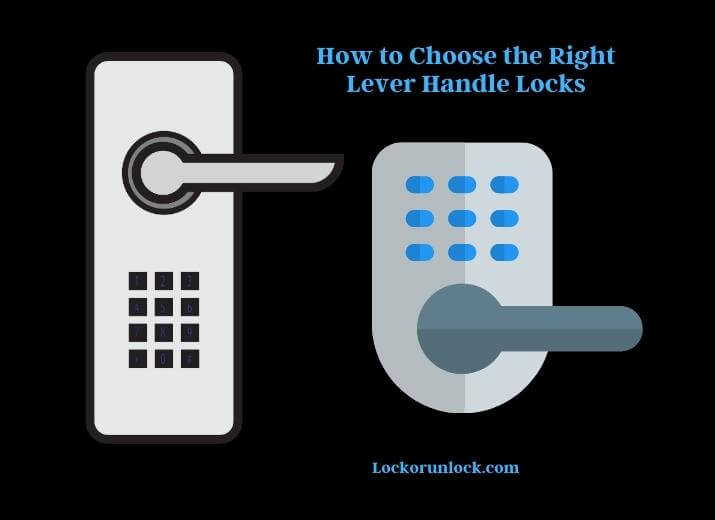Lever handle locks have been used for decades as a reliable and secure locking mechanism for various types of doors. Unlike traditional knob locks, lever handle locks provide easy accessibility and operation for people of all ages and abilities, including those with limited hand mobility or strength. They are also compliant with the Americans with Disabilities Act (ADA), making them an excellent choice for businesses and public buildings.

In recent years, lever handle locks have gained popularity among homeowners due to their ease of use and superior security features. They offer greater peace of mind and protection for your property, whether you are at home or away.
Types of Lever Handle Locks
There are several types of lever handle locks available, each with its own unique features and benefits. Some of the most common types of lever handle locks include:
Single-Cylinder Lever Handle Locks
As I explained earlier, these locks have a lever handle on one side and a keyed cylinder on the other.
Double-Cylinder Lever Handle Locks
These locks have keyed cylinders on both sides of the door, which require a key to open from either side. They are often used on doors with glass panels to prevent someone from breaking the glass and reaching in to unlock the door.
Classroom Lever Handle Locks
These locks are typically used on classroom doors and have a lever handle on the inside and a keyed cylinder on the outside. However, they can also be locked from the inside using a thumb turn.
Storeroom Lever Handle Locks
Similar to classroom locks, these locks have a lever handle on the inside and a keyed cylinder on the outside. However, they cannot be locked from the inside, making them ideal for storerooms or other areas that need to be secured at all times.
Passage Lever Handle Locks
These locks have a lever handle on both sides of the door and do not have a locking mechanism. They are often used on interior doors where privacy is not a concern.
Privacy Lever Handle Locks
These locks have a push-button or thumb turn on the inside of the door that can be used to lock the door from the inside. They are commonly used on bathroom and bedroom doors.
How to Choose the Right Lever Handle Locks?
When it comes to choosing the right lever handle lock, there are a few factors you need to consider.

Consider the Level of Security Required
The level of security you need will depend on the type of door and the location of your property. For example, exterior doors will require a higher level of security than interior doors. Look for lever handle locks that offer a high level of security, such as keyed entry lever locks with deadbolts.
Think about the Function of the Door
Consider the function of the door that you want to install the lever handle lock. For example, bathroom and bedroom doors will require privacy lever locks, while interior doors leading to common areas will require passage lever locks.
Determine the Style and Finish
Lever handle locks come in a variety of styles and finishes, such as brushed nickel, brass, or bronze. Choose a style and finish that matches your decor and personal preferences.
Check for ADA Compliance
If you are installing a lever handle lock in a public building or business, check for ADA compliance. Lever handle locks that are ADA-compliant are designed to be accessible and operable by people with disabilities.
Consider Professional Installation
While lever handle locks are generally easy to install, it’s important to ensure that they are installed correctly for maximum security. Consider hiring a professional locksmith to install the lever handle lock for you.
Installation of Lever Handle Locks
Lever handle locks are relatively easy to install and can be done by most homeowners with basic tools. Here are the steps to follow for installation:
| 1 | Remove the existing lock from the door by unscrewing the screws that hold it in place. |
| 2 | Place the new lever handle lock in the same position as the old lock and align it with the door’s holes. |
| 3 | Insert the screws and tighten them securely with a screwdriver. |
| 4 | Test the lock’s functionality by turning the lever handle and ensuring that the latch mechanism engages and disengages correctly. |
| 5 | If necessary, adjust the strike plate by loosening the screws and moving it to ensure a secure fit. |
Maintenance of Lever Handle Locks
Regular maintenance of lever handle locks can help to extend their lifespan and ensure that they operate smoothly. Here are some maintenance tips to follow:
1. Clean the lock regularly with a soft cloth and mild soap and water to remove dirt and debris.
2. Lubricate the lock with a silicone-based lubricant every six months to prevent rust and ensure smooth operation.
3. Tighten any loose screws or bolts on the lock to ensure a secure fit.
4. Check the lock’s alignment periodically and adjust it if necessary to ensure that it operates correctly.
5. Test the lock’s functionality regularly to ensure that it is working correctly.
Benefits of Lever Handle Locks
Easy to use: One of the main advantages of lever handle locks is that they are easy to use. Unlike traditional knob locks, lever handle locks require less gripping and twisting motion, making them ideal for people with limited hand mobility or strength.
ADA Compliant
Lever handle locks are also compliant with the Americans with Disabilities Act (ADA). This means that they are designed to be easily accessible and operable by people with disabilities.
Safer for Young Children and the Elderly
Lever handle locks are much safer for young children and the elderly. Children can easily reach and operate lever handles, while the elderly can use them without having to grip and twist the knob, which can be difficult for those with arthritis or joint pain.
Versatile and Adaptable
Lever handle locks can be installed on a wide range of doors, including interior and exterior doors, and they are adaptable to different types of doors such as sliding doors, French doors, and even gates.
Provides Greater Security
Lever handle locks offer greater security compared to traditional knob locks. The lever handle is harder to break or force open, and it is more challenging for intruders to pick.
Troubleshooting of Lever Handle Locks
Sure, I can help you with troubleshooting lever handle locks. Here are some common issues and solutions:
The lock is difficult to turn: If the lock is hard to turn, it may be due to dirt or debris in the keyway. Try cleaning the keyway with a lubricant like WD-40 or graphite powder.
The key won’t turn: If the key won’t turn in the lock, it could be due to a damaged or worn-out key. Try using a spare key or getting a new key made.
The lock is loose: If the lock feels loose, it may be due to loose screws or a worn-out latch mechanism. Tighten any loose screws and check the latch mechanism for wear and tear. If necessary, replace the latch.
The lever handle is loose: If the lever handle is loose, it may be due to a loose screw. Tighten the screw or replace it if it is stripped.
The lock won’t latch: If the lock won’t latch, it may be due to a misaligned strike plate. Try adjusting the strike plate so that it aligns with the latch.
The lock is stuck: If the lock is stuck, try lubricating the keyway with a lubricant like WD-40 or graphite powder. If that doesn’t work, you may need to disassemble the lock and clean or replace any damaged parts.
If none of these solutions work, you may need to call a locksmith to help you diagnose and fix the problem.
Conclusion
Lever handle locks are an excellent choice for securing both residential and commercial properties. They come in a variety of styles, finishes, and security levels, making them versatile and customizable to your specific needs. When choosing a lever handle lock, it’s essential to consider the level of security you require, the function of the door, and the style and finish that matches your decor.
Installation and maintenance of lever handle locks are relatively easy and can be done by most homeowners with basic tools. By following the installation and maintenance tips outlined in this post, you can ensure that your lever handle lock continues to operate smoothly and provides reliable security for your property.
A lever handle lock is an excellent investment for your home or business’s security. It provides peace of mind knowing that your property is protected, and it’s a relatively affordable and straightforward solution for securing your doors. With the right type of lever handle lock and proper maintenance, you can enjoy a high level of security and ease of use for years to come.
